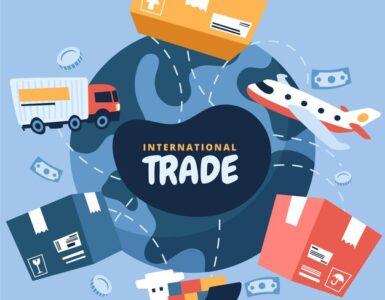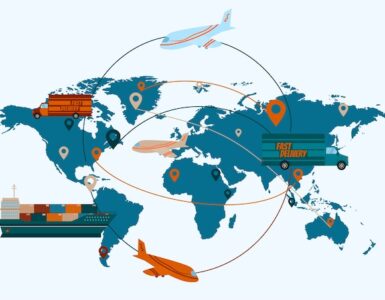There are several reasons why selling your goods or services abroad can be advantageous for your company.
 For one thing, it can assist you reach new clients and enter markets that you otherwise wouldn’t have been able to. Additionally, sales and revenue from overseas sales can help you expand your company. Furthermore, it might help you compete more effectively with companies in your field that sell abroad. In conclusion, selling abroad can also boost the economy and create jobs in your native country. Here is a summary of everything that is involved in international logistics: If you want to take your firm into the international market, you must evaluate how you now distribute your products physically. You must determine the cost of sending an international order offshore, for example, if you have inventory and ship orders from a single warehouse in your neighborhood. There are several options for handling the matter. From your own country, orders can be transported abroad. Moving to a warehouse, however, can be a good option if you want to cut costs on transportation and get your product near the border before it is transported outside. Air, sea, or land shipment, as well as parcel or freight shipping, are among the many modes of transportation available to you, depending on your budget and delivery schedule. Making the best decision requires carefully assessing the prices, journey durations, and reliability of each mode of transportation. It would also be advantageous if you selected the one that would optimize your profit margins. The majority of modes of transportation, especially international shipping, necessitate moving an order to a distant country. International orders are subject to a complicated shipping procedure with unpredictable delivery times. Delivery periods are quite long, depending on where you are sending it. Numerous regulatory bodies are also involved because the directives are transmitted from one country to another. In order to ensure that the transportation process is completed efficiently, you should confirm that the things you are carrying meet the country’s trade standards and rules and that your shipping documents are correct. Predicting last-mile delivery delays and updating your clients on order statuses are crucial. Shipping goods abroad will result in extra fees, such as import tariffs and customs. These taxes vary from country to country and are heavily impacted by the cost of the imported goods. The process of clearing customs in a nation also requires a great deal of paperwork. Furthermore, as the shipper, it is your responsibility to inform your customers of these fees. You will be held accountable for any products that are delayed at customs, and your customers may never pick up the purchase if they are unaware of the additional costs. Suggested Reading: How Logistics Can Help E-Commerce Increase Customer Loyalty The Role of Logistics in Enhancing Global Trade The logistical obstacles of international trading can be numerous. In addition to frequently lengthy shipping periods, firms must deal with rules, duties, and customs when shipping goods from one country to another. Special storage needs may also apply, depending on the kind of product being sent. Foods and medications, for instance, frequently need to be carried at regulated temperatures to maintain their efficacy and freshness. Due to their lack of resources, small enterprises may find the logistics of international trading to be intimidating. Notwithstanding, companies of all sizes can surmount these obstacles and capitalize on the prospects presented by international trade by collaborating with a trustworthy logistics partner. Some important actions that can be performed to enhance global trade include the following: 1. Encourage better communication and cooperation between all supply chain participants. This encompasses suppliers, manufacturers, freight forwarders, and customs brokers.
For one thing, it can assist you reach new clients and enter markets that you otherwise wouldn’t have been able to. Additionally, sales and revenue from overseas sales can help you expand your company. Furthermore, it might help you compete more effectively with companies in your field that sell abroad. In conclusion, selling abroad can also boost the economy and create jobs in your native country. Here is a summary of everything that is involved in international logistics: If you want to take your firm into the international market, you must evaluate how you now distribute your products physically. You must determine the cost of sending an international order offshore, for example, if you have inventory and ship orders from a single warehouse in your neighborhood. There are several options for handling the matter. From your own country, orders can be transported abroad. Moving to a warehouse, however, can be a good option if you want to cut costs on transportation and get your product near the border before it is transported outside. Air, sea, or land shipment, as well as parcel or freight shipping, are among the many modes of transportation available to you, depending on your budget and delivery schedule. Making the best decision requires carefully assessing the prices, journey durations, and reliability of each mode of transportation. It would also be advantageous if you selected the one that would optimize your profit margins. The majority of modes of transportation, especially international shipping, necessitate moving an order to a distant country. International orders are subject to a complicated shipping procedure with unpredictable delivery times. Delivery periods are quite long, depending on where you are sending it. Numerous regulatory bodies are also involved because the directives are transmitted from one country to another. In order to ensure that the transportation process is completed efficiently, you should confirm that the things you are carrying meet the country’s trade standards and rules and that your shipping documents are correct. Predicting last-mile delivery delays and updating your clients on order statuses are crucial. Shipping goods abroad will result in extra fees, such as import tariffs and customs. These taxes vary from country to country and are heavily impacted by the cost of the imported goods. The process of clearing customs in a nation also requires a great deal of paperwork. Furthermore, as the shipper, it is your responsibility to inform your customers of these fees. You will be held accountable for any products that are delayed at customs, and your customers may never pick up the purchase if they are unaware of the additional costs. Suggested Reading: How Logistics Can Help E-Commerce Increase Customer Loyalty The Role of Logistics in Enhancing Global Trade The logistical obstacles of international trading can be numerous. In addition to frequently lengthy shipping periods, firms must deal with rules, duties, and customs when shipping goods from one country to another. Special storage needs may also apply, depending on the kind of product being sent. Foods and medications, for instance, frequently need to be carried at regulated temperatures to maintain their efficacy and freshness. Due to their lack of resources, small enterprises may find the logistics of international trading to be intimidating. Notwithstanding, companies of all sizes can surmount these obstacles and capitalize on the prospects presented by international trade by collaborating with a trustworthy logistics partner. Some important actions that can be performed to enhance global trade include the following: 1. Encourage better communication and cooperation between all supply chain participants. This encompasses suppliers, manufacturers, freight forwarders, and customs brokers.





















































